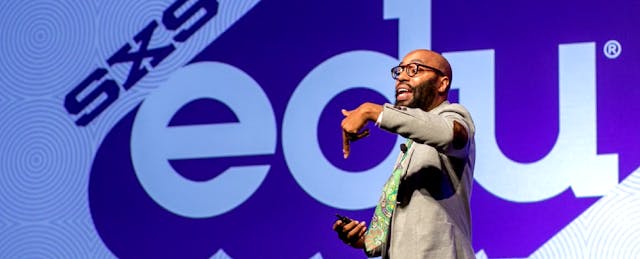Dr. Christopher Emdin has a clear message for this year’s SXSWedu attendees: “When a student is brilliant on the street corner but falling asleep in class, something is wrong with the schooling system.”
An associate professor in the Department of Mathematics, Science and Technology at Columbia University’s Teachers College, Emdin kicked off the annual conference this year with a keynote speech titled after the latest album by the rap group, A Tribe Called Quest: “We Got it From Here... Thank You 4 Your Service.” With a flow and cadence of his own, Emdin repeatedly returned to lyrics from the album, citing the complexities and insight that hip-hop culture can reveal about many young people’s experiences within the U.S. education system.
In doing so, Emdin had the hundreds of educators, policy experts and edtech entrepreneurs who flew to Austin, Tex. for the conference cheering, clapping and in some cases crying during a fiery speech that at times felt more like a church revival than an education conference.
"No more, will you allow our brilliance to feel insignificant. We got it from here... thanks for your service." - @chrisemdin #SXSWedu pic.twitter.com/ZLSIBKNY4Y
— SXSWedu (@SXSWedu) March 6, 2017
Are You a Frenemy?
Emdin, who last year hit the New York Times’ bestseller list with his book “ For White Folks Who Teach in the Hood... and the Rest of Y'all Too,” was quick to address the injustices he sees as most prevalent among the U.S. education system—issues which he reiterated educators and entrepreneurs cannot “tech away.” And even though facing a largely tech-friendly audience, Emdin pounded out his disagreements with the education entrepreneurs and reformers.
“There are people in the world of education who are simply here to listen to good ideas and monetize off of them,” said Emdin. “I don’t worry about people gettin’ they bread, but you can’t take and not give back.”
Emdin labeled financially-driven education entrepreneurs as “enemies.” And he took on the nonprofit leaders, policymakers and edtech do-gooders he believes have “good intentions but enemy executions,” dubbing them “frenemies.”
“You got white folks in urban spaces who by virtue don’t understand the complexity of urban spaces,” Emdin said. “They think they are going in and doing good work, but they are extracting the culture out of [students].”
“This is not anti-Coding Academy,” he continued. “It’s anti—‘the perverse notion that I can go to a community, frame a charity as opening up new possibilities for [students] when in reality I still have low expectations for them,’” Emdin said.
Stop extracting culture, teach souls. #SXSWEdu #HipHopEd#SEL pic.twitter.com/bmr7mAqi0v
— Kaili Palmer (@KailiPalmer) March 6, 2017
Can’t ‘Tech Away’ Trauma
The problem goes far beyond intentions, Emdin emphasized. “Trauma is living in the bodies of young folks in schools today. A President Trump stress disorder is a real phenomenon.”
“We have become adjusted to a society that imposes that trauma,” he went on, referencing recent events such as a father who was arrested by U.S. Immigration and Customs Enforcement while dropping his 13-year-old daughter off at school, and the widely publicized killings of unarmed black men in the wake of Trayvon Martin’s death.
“In class we focus on standards and can’t talk about those emotions, but young folks are carrying those emotions into the class every day,” he said. “We have become adjusted to the fact that young folks have trauma.”
Rather than teaching youth to conform to a system that many believe has historically marginalized them, Emdin encouraged the audience—and students—to “maladjust” from the status quo. “We are inheriting a trauma that’s in the bones of the institution. And if you can’t name that trauma and be maladjusted, you ain’t going nowhere.”
Name the trauma. Maladjustment. PTSD. Too many jewels to catch... #SXSWedu
— Katherine Wheatle (@DrWheatle2B) March 6, 2017
Where From Here?
A self-described “rache-demic” (a.k.a. ratchet academic), Emdin closed his speech by encouraging educators to embrace hip-hop culture along with academic achievement. “It is possible to listen to hip-hop music and have a Ph.D.,” said Emdin. He also urged friends to “convert” their enemies and frenemies by having more conversations about race and equity.
"Students should have the ability to consider themselves as ratchet as they consider themselves academic." - Christopher Emdin #SXSWEdu
— Pius Wong (@PiusWong) March 6, 2017
“We integrated schools, we sent black kids to white schools, but we never integrated curriculum and approaches,” Emdin explained. He challenged educators—specifically white educators—to try to understand the traumatic effect that past adjustment strategies have had on students and teachers.
“At the end of the day, all youth benefit from being exposed to a more robust approach to teaching and learning, all learners benefit from complexity,” declared Emdin.
Watch the full speech:


